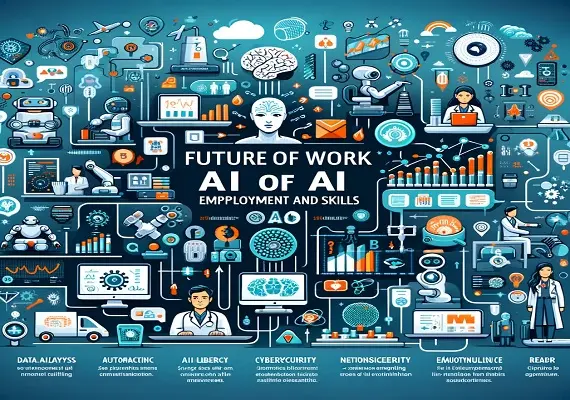AI on the Future of Work
- August 28, 2024
- Views 113
The Impact of AI on the Future of Work: What to Expect
Artificial Intelligence (AI) is transforming the world as we know it, and one of the most profound areas of change is the future of work. As AI continues to evolve, its influence on the workplace is becoming more significant, affecting everything from job roles and industry practices to workforce dynamics and economic structures. While AI presents incredible opportunities for innovation and efficiency, it also raises important questions about employment, skills, and the role of human workers in an increasingly automated world.
In this blog, we'll explore the impact of AI on the future of work, examining both the opportunities and challenges it presents and what we can expect in the years to come.
1. Automation and Job Transformation
One of the most immediate and noticeable impacts of AI on the workforce is the automation of tasks and processes. AI technologies, such as machine learning, robotics, and natural language processing, are increasingly capable of performing tasks that were once solely the domain of human workers.
Key Areas of Impact:
- Manufacturing: AI-powered robots are taking on more complex tasks in manufacturing, from assembling products to quality control. This has led to increased efficiency and reduced costs but also a decline in traditional manufacturing jobs.
- Customer Service: Chatbots and AI-driven customer support systems are becoming more sophisticated, handling inquiries, processing orders, and even resolving issues without human intervention.
- Data Analysis: AI algorithms can process vast amounts of data at incredible speeds, identifying patterns and insights that would take humans much longer to uncover. This is transforming fields like finance, healthcare, and marketing.
While AI-driven automation can enhance productivity, it also leads to job displacement, particularly in roles that involve repetitive, routine tasks. However, it's important to note that AI isn't just about replacing jobs—it’s also creating new ones and transforming existing roles.
2. The Rise of New Job Categories
As AI automates certain tasks, it also creates demand for new skills and job categories. The future of work will see a shift towards roles that require a combination of technical expertise, creativity, and emotional intelligence—areas where humans excel and AI cannot fully replicate.
Emerging Job Roles:
- AI Specialists: As companies adopt AI technologies, there’s an increasing need for professionals who can develop, manage, and maintain AI systems. This includes roles like machine learning engineers, data scientists, and AI ethicists.
- Digital Creators: While AI can assist with content generation, the need for human creativity and storytelling remains strong. Jobs in digital media, design, and marketing will continue to thrive, with AI serving as a tool to enhance creativity rather than replace it.
- Human-AI Collaboration Experts: New roles are emerging to facilitate the interaction between humans and AI systems, ensuring that AI tools are user-friendly, ethical, and effectively integrated into workplaces.
The demand for these roles highlights the importance of reskilling and upskilling the workforce. As AI reshapes industries, lifelong learning and adaptability will become essential for career success.
3. Redefining Workplace Dynamics
AI is not just changing the types of jobs available but also how work is organized and executed. The integration of AI into the workplace is leading to a more flexible, dynamic work environment.
Key Changes:
- Remote and Hybrid Work: AI tools are making it easier to work remotely, enabling tasks like virtual collaboration, project management, and even virtual reality meetings. This shift towards remote and hybrid work models is likely to continue, offering greater flexibility for workers.
- Personalized Work Experiences: AI can analyze employee behavior and preferences to create personalized work experiences, from customized training programs to tailored career development paths.
- Decision-Making: AI is becoming a crucial tool in decision-making processes, providing data-driven insights that help leaders make more informed and objective choices.
These changes are creating a workplace that is more adaptable to individual needs and preferences, potentially leading to increased job satisfaction and productivity.
4. Ethical Considerations and Challenges
While the benefits of AI are significant, its integration into the workplace raises important ethical questions and challenges that need to be addressed.
Major Concerns:
- Job Displacement: The automation of tasks through AI could lead to significant job losses in certain sectors, particularly those involving routine, manual work. The challenge lies in managing this transition and ensuring that workers are retrained and redeployed.
- Bias and Fairness: AI systems can inadvertently perpetuate biases present in the data they are trained on. This can lead to unfair hiring practices, biased decision-making, and a lack of diversity in the workplace.
- Privacy and Surveillance: AI technologies used for employee monitoring and data analysis raise concerns about privacy and the potential for excessive surveillance.
Addressing these challenges requires thoughtful regulation, ethical AI development, and a commitment to transparency and fairness.
5. Preparing for the Future
As AI continues to shape the future of work, individuals, companies, and governments must take proactive steps to prepare for these changes.
For Individuals:
- Embrace Lifelong Learning: Continuously updating skills and knowledge will be essential as job roles evolve. Focus on developing both technical skills (such as coding, data analysis, and AI literacy) and soft skills (like creativity, critical thinking, and emotional intelligence).
- Adaptability: Cultivate a mindset of flexibility and openness to change, as the pace of technological advancements continues to accelerate.
For Companies:
- Invest in Reskilling: Companies should invest in training programs to help employees transition into new roles that AI technologies create. This will not only benefit employees but also ensure that companies have the skilled workforce needed for the future.
- Ethical AI Practices: Implement AI technologies responsibly, with a focus on fairness, transparency, and inclusivity. This includes regularly auditing AI systems for bias and ensuring they are aligned with ethical standards.
For Governments and Policymakers:
- Create Supportive Policies: Governments need to develop policies that support workers during the transition to an AI-driven economy. This could include funding for education and reskilling programs, as well as social safety nets for those affected by job displacement.
- Regulate AI Development: Establishing clear regulations around the development and use of AI is crucial to address ethical concerns and ensure that AI benefits society as a whole.
Final Thoughts
The impact of AI on the future of work is both exciting and challenging. While AI has the potential to revolutionize industries, increase productivity, and create new opportunities, it also poses significant challenges that must be addressed. By embracing lifelong learning, fostering adaptability, and prioritizing ethical practices, we can ensure that the future of work is one where both humans and AI thrive together.
As we navigate this rapidly changing landscape, it’s clear that AI will continue to be a driving force in shaping the way we work, live, and interact with the world around us. The key to success will be our ability to adapt, innovate, and work alongside AI to build a future that benefits everyone.






